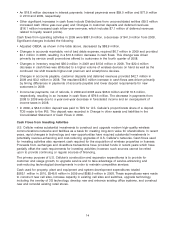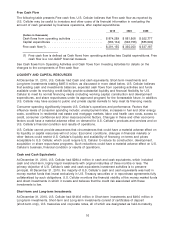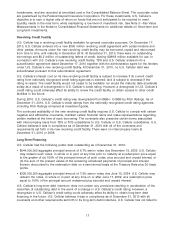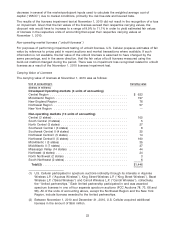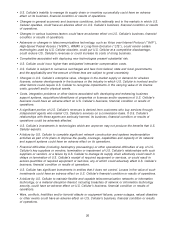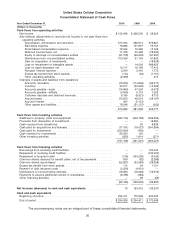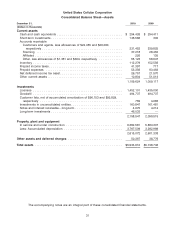US Cellular 2010 Annual Report Download - page 32
Download and view the complete annual report
Please find page 32 of the 2010 US Cellular annual report below. You can navigate through the pages in the report by either clicking on the pages listed below, or by using the keyword search tool below to find specific information within the annual report.Allowance for Doubtful Accounts
U.S. Cellular’s accounts receivable primarily consist of amounts owed by customers pursuant to service
contracts and for equipment sales, by agents for sales of equipment to them and by other wireless
carriers whose customers have used U.S. Cellular’s wireless systems.
The allowance for doubtful accounts is the best estimate of the amount of probable credit losses related
to existing accounts receivable. The allowance is estimated based on historical experience and other
factors that could affect collectability. Accounts receivable balances are reviewed on either an aggregate
or individual basis for collectability depending on the type of receivable. When it is probable that an
account balance will not be collected, the account balance is charged against the allowance for doubtful
accounts. U.S. Cellular does not have any off-balance sheet credit exposure related to its customers.
U.S. Cellular will continue to monitor its accounts receivable balances and related allowance for doubtful
accounts on an ongoing basis to assess whether it has adequately provided for potentially uncollectible
amounts.
See Note 1—Summary of Significant Accounting Policies and Recent Accounting Pronouncements in the
Notes to Consolidated Financial Statements for additional information regarding U.S. Cellular’s allowance
for doubtful accounts.
Loyalty Reward Program
See the Revenue Recognition section of Note 1—Summary of Significant Accounting Policies and Recent
Accounting Pronouncements to the Notes to Consolidated Financial Statements for a description of this
program and the related accounting.
U.S. Cellular follows the deferred revenue method of accounting for its loyalty reward program. Under
this method, revenue allocated to loyalty reward points is deferred and recognized at the time the
customer redeems loyalty reward points. U.S. Cellular does not have sufficient historical data in which to
estimate any portion of loyalty reward points that will not be redeemed. As such, 100% of the value of
the loyalty reward points is deferred until redeemed. U.S. Cellular will periodically review and revise the
redemption rate as appropriate based on history and related future expectations.
CERTAIN RELATIONSHIPS AND RELATED TRANSACTIONS
U.S. Cellular is billed for all services it receives from TDS pursuant to the terms of various agreements
between U.S. Cellular and TDS. These billings are included in U.S. Cellular’s Selling, general and
administrative expenses. Some of these agreements were established prior to U.S. Cellular’s initial public
offering, when TDS owned more than 90% of U.S. Cellular’s outstanding capital stock, and may not
reflect terms that would be obtainable from an unrelated third party through arms-length negotiations.
Billings from TDS to U.S. Cellular are based on expenses specifically identified to U.S. Cellular and on
allocations of common expenses. Such allocations are based on the relationship of U.S. Cellular’s
assets, employees, investment in property, plant and equipment and expenses to the total assets,
employees, investment in property, plant and equipment and expenses of TDS. Management believes
that the method TDS uses to allocate common expenses is reasonable and that all expenses and costs
applicable to U.S. Cellular are reflected in U.S. Cellular’s consolidated financial statements. Billings from
TDS to U.S. Cellular totaled $107.5 million, $114.8 million and $113.3 million for 2010, 2009 and 2008,
respectively.
The following persons are partners of Sidley Austin LLP, the principal law firm of U.S. Cellular and its
subsidiaries: Walter C.D. Carlson, a director of U.S. Cellular, a director and non-executive Chairman of
the Board of Directors of TDS and a trustee and beneficiary of a voting trust that controls TDS; William S.
DeCarlo, the General Counsel of TDS and an Assistant Secretary of TDS and certain subsidiaries of TDS;
and Stephen P. Fitzell, the General Counsel of U.S. Cellular and TDS Telecommunications Corporation
and an Assistant Secretary of U.S. Cellular and certain other subsidiaries of TDS. Walter C.D. Carlson
does not provide legal services to TDS, U.S. Cellular or their subsidiaries. U.S. Cellular and its
subsidiaries incurred legal costs from Sidley Austin LLP of $9.8 million in 2010, $8.6 million in 2009 and
$6.9 million in 2008.
The Audit Committee of the Board of Directors is responsible for the review and evaluation of all related
party transactions, as such term is defined by the rules of the New York Stock Exchange.
24


